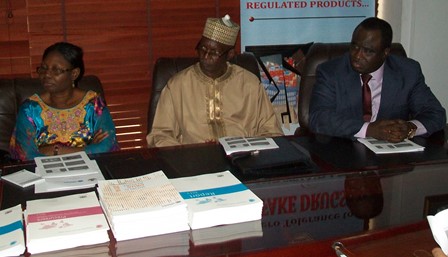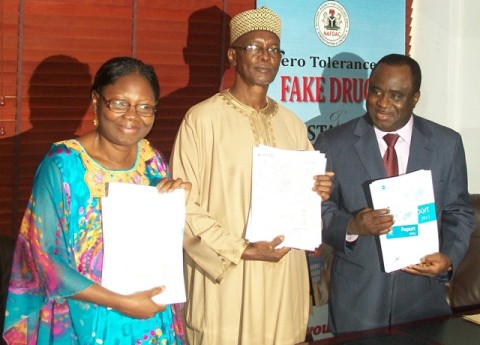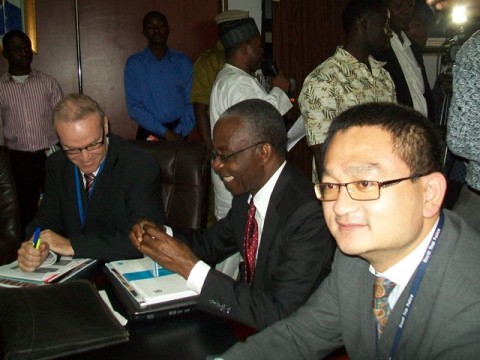Press Release



The World Drug Report 2014 has scored Nigeria higher than other African countries in cannabis seizure. This was made known on Thursday in Abuja during the dissemination meeting for the United Nations Office on Drugs and Crime (UNODC) 2014 World Drug report and International Narcotic Control Board (INCB) 2013 report. The key players at the meeting were the UNODC country representative, Ms. Mariam Sissoko, Chairman/Chief Executive of the National Drug Law Enforcement Agency (NDLEA), Ahmadu Giade and Director General of National Agency for Food Drug Administration and Control (NAFDAC), Dr. Paul Orhii.
In his keynote address, Giade stressed that the Agency will continue to intensify its cannabis control mandate geared towards ensuring a crime free society and peaceful election in 2015. “Cannabis is the common drug of abuse in Nigeria and as the election year 2015 draws nearer, we are fine tuning our strategies to cut off supply and ensure a crime-free election and a healthy society for all” the NDLEA boss stated.
While calling on parents to monitor their children and wards, Giade stressed that drug control programmes are more effective when supported by stakeholders. In his words, “Drug control measures are more effective when community leaders, families, media and individuals support anti-drug abuse programmes. Parents must monitor their children to prevent drug use and seek early help for those with substance abuse problems”.
Illicit drugs seized in 2013 by the NDLEA weighed 339,968kg with an estimated street value of N34 billion naira. The breakdown is as follows; cannabis 205,373kg, psychotropic substances 133,920kg, methamphetamine 340.8kg and cocaine 290.2kg. Others are heroin 24.53kg, amphetamine 19.297 and ephedrine 0.28 grammes. In 2013 alone, a total of 3,271 drug dependent persons were successfully counselled in NDLEA facilities nationwide. This comprises of 3,062 males and 209 females. Additional 802 treated cases were reported by hospitals and other drug dependence treatment centres in Nigeria.
According to the reports which were presented by Professor Isidore Obot, Head of Psychology Department, University of Uyo, Nigeria was rated highest in cannabis seizure in Africa. “Nigeria remains the country with the largest seizures of cannabis in the region followed by Egypt” the report stated. The report added that cannabis is the most prominent drug in offences for possession for personal use. With regards to trafficking offences, Amphetamine Type Stimulant (ATS) is prominent in Asia and cocaine in the Americas.
UNODC country representative Mariam Sissoko stated that this year’s World Drug Report shows that “around 243 million people, aged 15-64 consumed an illicit drug in 2012. Out of this number, problem drug users, those who have most difficulties with drug consumption, account for around 27 million or 1 in every 200 people”. The report exposed a gap in the treatment of drug abuse as only 1 in 6 drug users around the world receive the drug dependence treatment they need.
The report also highlighted the economic consequences of drug abuse, impact on health, public safety, crime, productivity and governance. Cost of drug prevention and treatment globally is estimated at $35 billion dollars.
Dr. Paul Orhii expressed optimism that the reports will enhance the principle of shared responsibility among drug regulatory authorities, reveal socio-economic implications of drug use and promote the use of narcotic drugs and psychotropic substances only for medical and scientific purposes.
The reports have recommended the development of comprehensive strategies in addressing prescription drug abuse, support domestic and international investigations targeting organized criminal networks, promote the application of drug control treaties as well as develop practical measures to effectively prevent new psychoactive substances.
The event was attended by Manuel Alberto from the Embassy of Spain, Sergey Antonov from the Embassy of Russia, Mr. Glen Prichard UNODC, Mr. William Wu UNODC, Ms. Maureen Lance UNODC, Dr. Mary Stephen from World Health Organisation (WHO), Dr. Sintiki Tarfa Ugbe from Economic Community of West African States (ECOWAS) and Acting Director of Food and Drugs, Federal Ministry of Health Mrs Vera Nkem Ogbeche among other dignitaries.
Ofoyeju Mitchell
Head, Public Affairs






